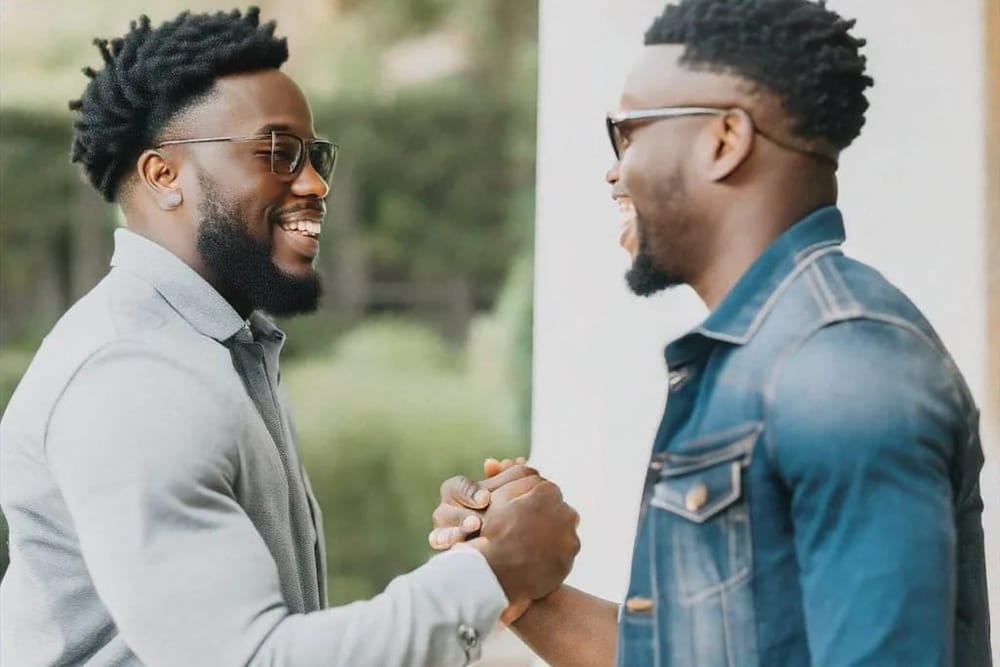It’s quite common that when Black men greet each other, or even others who are close with them, they embrace with a warm clasp of hands.
Key and Peele comedically highlighted this in one of their famous skits where a fictional Barack Obama exchanges handshakes and hugs with fellow Black men and women after a press conference but greets white folks quite differently.
My first recollection of the handshake was in middle school in Columbus, Ohio.
The school had been integrated shortly before I started there, thanks to the late Judge Robert Duncan, who in 1977 ruled in Penick v. Columbus Board of Education that school officials were intentionally using school boundary methods to keep Black and white students separate.

My elementary school, unlike my middle school, was a perfect example. All white, except one Black kid. The only other Black people I saw were on television or in sports. Or at the mall.
When I first saw the way Black kids embraced in 6th grade, I was curious and intrigued.
Why was there more warmth between them than the rest of the kids? Why did they smile wider? Laugh harder? Embrace and hug more? Shake hands differently?
It wasn’t politics. As an 11-year-old, I just wanted in on the brotherly love. It seemed so genuine.
While the rest of America uses a more sterile and formal traditional handshake, Black Americans have used what is referred to as the DAP greeting for nearly 60 years.

DAP stands for dignity and pride.
The handshake, which has many forms depending on what part of the country you’re from, originated in the late 1960s among Black soldiers in the Vietnam War.
It was a form of nonverbal solidarity among Black soldiers in the wake of significant racial unrest in America, major discrimination and segregation in the military, and multiple disturbing instances of white soldiers shooting Black soldiers written off as “mistakes.”
Of course, like most things Black folks do, the white establishment would have none of it at first.
The military saw the DAP handshake as a threat, believing it was a secret form of Black disobedience and potential insurrection tied to the Black Power movement. The Black Panther Party had been gaining steam since its founding by Huey P. Newton in 1966.
Side note, I find it interesting how many times the U.S. government has been scared stiff Black folks might revolt. I wonder why? Did they do something wrong? (insert sarcastic tone here).
The armed forces ultimately banned DAP and ended up court-martialing, imprisoning and even dishonorably discharging any Black man caught doing the handshake.
Oh, that dangerous, terrifying handshake.
But the military prohibition had the opposite effect. Like Rosa Parks sitting on that bus seat she was told not to, Black men in the military and throughout society increased their use of the handshake.
It became an integral part of Black culture.
The ridiculous military edict caused Black men to want to use the symbol even more as a forever “I got you” reassurance to their brothers. To have each other’s back. To let each other know, “I love you.”
Today, the government obviously isn’t prohibiting the handshake. In fact, it’s now been adopted in some white circles, like so many other Black cultural norms. The ongoing irony.
The remarkable thing, though, is Black folks turned a prohibited handshake into a beautiful gesture of love.
Time and time again, Black Americans have turned lemons into lemonade.
Nearly every disgusting and abusive card they’ve been dealt, they’ve turned into something positive.
From enslavement came cutting-edge agricultural inventions created by numerous Black geniuses. Some methods still used today.
It’s where Tennessee Whiskey came from. Same method learned from an enslaved Black man.
From the gross, racist “N” word came a reinvention by Black people that turned it into code for “my brother.” I’ve never been a fan myself, but you all know what I’m talking about.
While the U.S. over and over denied Black folks educational opportunities, Black folks didn’t sit still. They transformed the few areas they were allowed to participate in.
Fashion. Sports. Music. Poetry. Literature. And so many other things.
Dignity and Pride. Forever part of Black culture.
This post originally appeared on Medium and is edited and republished with author's permission. Read more of Jeffrey Kass' work on Medium.

